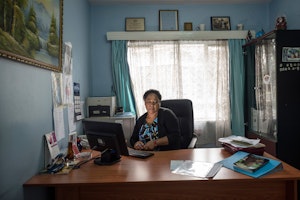African Union: A New Frontier for Challenging Prohibition?
By Joanne Csete
Africa is frequently highlighted in international media as the new frontier in the war on drugs – the region of the world that has most recently seen the establishment of drug trafficking routes and growing consumption of illicit drugs. Some of this coverage may be sensational, as often is the case with drugs. What limited objective evidence we have does suggest that drug trafficking has increased dramatically on the continent in the last 20 years and that in many parts of Africa drug consumption and especially drug injection are problems of public health importance, including in the threat they represent of new HIV epidemics.
The African Union, the 54-nation body that brings together the entire continent – north and south of the Sahara – has taken on drugs in the past largely as a challenge of supply reduction and law enforcement, as befits a region where national drug laws are harsh and punitive. The five-year Plan of Action that ministerial-level delegations to the AU adopted last week was an attempt instead to see and address the drug problem with the tools not only of policing and interdiction but also of health and social support.
AU Commissioner for Human Resources, Science and Technology Jean-Pierre Ezin, one of the highest-level AU officials at the meeting, set a new tone for drug debates on the continent when he noted that some African countries “have been quietly implementing evidence-based programs that deal with the harms of drug use and of drug prohibition.” He enjoined AU member states to “separate drug use from organized crime and trafficking” and focus law enforcement efforts on the latter and health and social support on the former.
Balanced and evidence-based approaches were also emphasized in a presentation to the AU, sponsored by OSF’s Global Drug Policy Program, by four policy-makers and health leaders from Tanzania. This East African country has Africa’s biggest government-run methadone program with over 1500 patients planned by late 2013. Through their truly inter-sectoral Drug Control Commission, Tanzanian health professionals have had the chance to be around the table with police and justice officials and have found common ground in the idea that persons living with opiate addiction who commit minor infractions should have the chance to receive effective treatment rather than enter the cycle of arrest and detention that never seems to end. There was rapt attention as the Tanzanian experts described a situation in which the police now show their support of the methadone program by helping to steer drug users in its direction.
The drug law in Tanzania remains, like many in the region, draconian, allowing for long prison sentences for even minor possession or use convictions. But in Dar es Salaam for now, there is an entente with the police and the judicial system that makes possible this experiment in public health-friendly practice. The Tanzanian experts at the AU recognized that to sustain and continue to expand the methadone program, it will be necessary to change the law, a longer-term project.
During the expert session of the AU that preceded the ministerial session, it was striking that many officials, even those from outside the health sector, raised the problem of lack of specialized care for people with drug dependence. More than once, the delegates lamented that the only regular care for addiction in many countries is in-patient care in psychiatric hospitals. As was noted repeatedly, it is not realistic to expect that people with addictions will welcome care that requires them to be classified as “mad” or having severe psychiatric disorders. Member states renewed their call for African Union assistance and leadership in establishing centers of excellence for training professionals in addiction medicine. Donor countries would do well to give priority to this issue.
The matter of humane treatment for addiction is not isolated from larger drug policy questions. The new AU Plan of Action for 2013-2017 challenges member states to implement alternatives to arrest and detention for minor drug offenses. As was rightly pointed out by the South African delegate in the expert session, without high-quality health and social support for people who use drugs, criminal justice authorities will be unconvinced that there exists a viable alternative to incarceration with its many harms.
The AU also passed a solid guideline to help its members improve their ability to estimate the quantity of opiates and other controlled substances needed for pain management and other medical and scientific uses. Africa remains the region of the world with the poorest access by far to pain medicines for those who need them.
The basic framework of the new Plan of Action will be considered by the AU heads of state in January. It is always difficult to know what the statements of any given multilateral body really mean, practically speaking, in the daily decision-making of member states. Drug laws will remain harsh for the foreseeable future. But it is significant that the AU has at least put on paper and achieved some level of consensus around the idea that just scaling up policing is not an adequate response to a growing and complex drug problem on the continent. The instinct of some of the heads of state will naturally be to appear “tough on crime” and thus tough on drugs. One hopes that the spirit of a balanced approach to drug policy that prevailed in the ministerial session will find some currency among the heads of state in the new year.
Joanne Csete is a researcher for the Open Society Public Health Program and Global Drug Policy Program.


